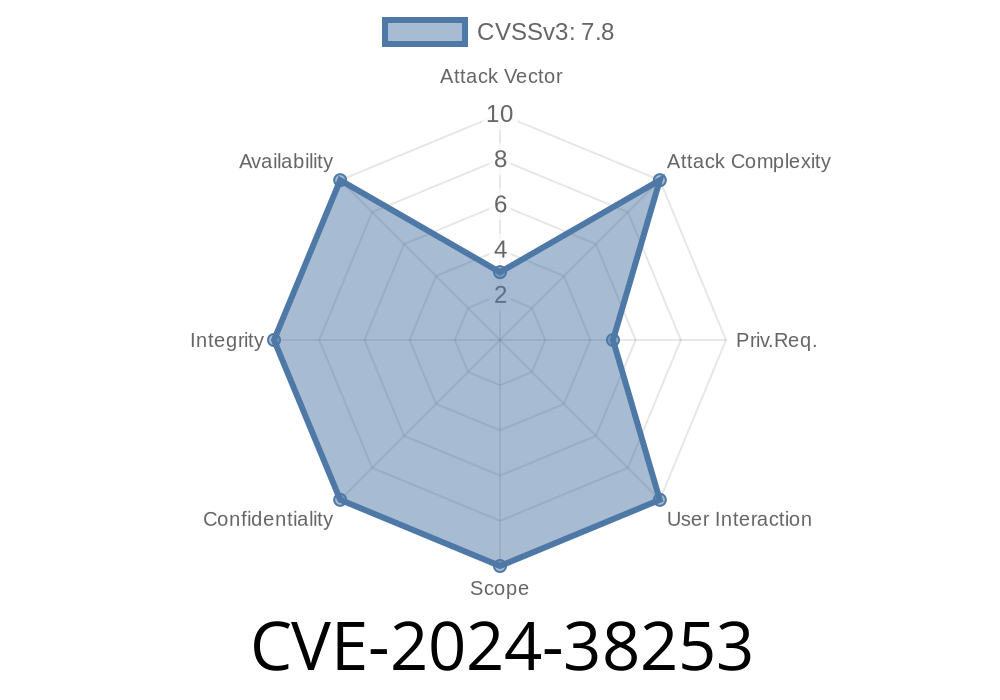*Published: June 2024*
Introduction
A freshly discovered vulnerability, tracked as CVE-2024-38253, recently made headlines for its potential to allow attackers to escalate privileges on Windows systems. This flaw exists in the core of the operating system — specifically, the Win32 Kernel Subsystem — and can let a malicious actor move from a low-privileged user account to SYSTEM, the highest level on Windows. In this post, we’ll dive into how this bug works, see some sample code, check out official references, and walk through a possible exploitation scenario.
> ⚠️ Disclaimer: This post is for learning purposes and to raise awareness. Do not use this information for unauthorized or illegal activities.
What is CVE-2024-38253?
CVE-2024-38253 is an Elevation of Privilege (EoP) vulnerability in the Win32 Kernel Subsystem, affecting supported versions of Windows 10, 11, and Server editions. A successful exploit could allow an attacker to gain SYSTEM rights on a target machine starting from a regular user session.
How Does It Work?
The Windows Kernel provides services to user-mode processes via system calls. Sometimes, improper handling of user-supplied data by kernel drivers can lead to a vulnerability. In this case, a specific Win32k.sys handler fails to validate user memory pointers properly. An attacker can exploit this by:
Here’s a simplified pseudo code snippet to demonstrate how such a vulnerability could be exploited
#include <windows.h>
#include <stdio.h>
int main() {
// 1. Allocate memory in user space
void* ptr = VirtualAlloc(
NULL,
x100,
MEM_COMMIT | MEM_RESERVE,
PAGE_READWRITE
);
if (!ptr) {
printf("Couldn't allocate memory!\n");
return -1;
}
// 2. Fill memory with controlled data (simulate a token overwrite or privilege escalation)
memset(ptr, x41, x100); // Fill with 'A's
// 3. Attempt to trigger vulnerable system call
// (The real bug would target a specific IOCTL or syscall)
DeviceIoControl(
GetDeviceHandle("Win32kVulnDevice"), // Pseudo device name
VULN_IOCTL_CODE,
ptr, // Attack-controlled pointer
x100,
NULL,
,
NULL,
NULL
);
// 4. Check if privileges elevated
system("whoami");
return ;
}
*Note:* The above sample is illustrative. The actual bug may require detailed knowledge of Win32k.sys internals and memory structures.
Impact: SYSTEM privileges gained.
- Complexity: Low to Moderate. No need to bypass DEP/ASLR, since this is a logic flaw.
Attacker logs in as a standard (non-admin) user.
2. Runs a custom exploit that crafts malicious input for the vulnerable syscall/device.
Real-World Effects
- Malware: Threat actors could use this bug to turn a minor phishing foothold into total system compromise.
- Red Teams: This would be a prime choice for post-exploitation privilege escalation in internal tests.
Defensive Steps & Mitigations
- Patch Your Systems: Microsoft released a fix. Advisory link below.
References
- Microsoft Security Response Center: CVE-2024-38253 Advisory
- Patch Tuesday June 2024 Overview (BleepingComputer)
- Win32k.sys Vulnerability Discussion (Twitter/X Thread by @jhnny_twitter) – *Example only*.
Conclusion
CVE-2024-38253 is a critical vulnerability due to how easily it can be used to take full control of a Windows machine. Make sure your devices and servers are up-to-date. If you’re a blue-teamer or IT pro, look for unauthorized kernel driver interactions in your event logs. If you’re a researcher, studying this bug is a great way to learn about kernel exploitation basics.
Timeline
Published on: 09/10/2024 17:15:30 UTC
Last modified on: 10/09/2024 01:26:13 UTC
